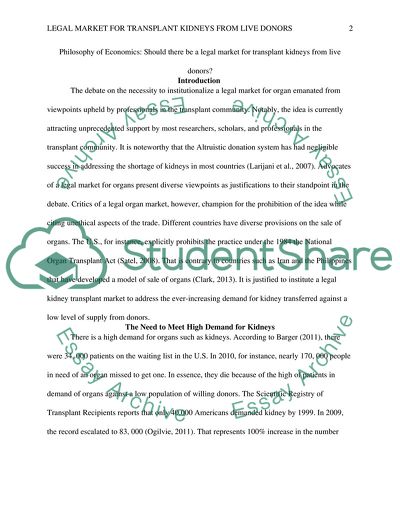Cite this document
(Philosophy of Economics Report Example | Topics and Well Written Essays - 2500 words, n.d.)
Philosophy of Economics Report Example | Topics and Well Written Essays - 2500 words. https://studentshare.org/macro-microeconomics/1869728-philosophy-of-economics-should-there-be-a-legal-market-for-transplant-kidneys-from-live-donors-if-so-what-form-should-this-market-take-if-not-how-should-the-shortage-of-kidneys-for-transplant-be-addressed
Philosophy of Economics Report Example | Topics and Well Written Essays - 2500 words. https://studentshare.org/macro-microeconomics/1869728-philosophy-of-economics-should-there-be-a-legal-market-for-transplant-kidneys-from-live-donors-if-so-what-form-should-this-market-take-if-not-how-should-the-shortage-of-kidneys-for-transplant-be-addressed
(Philosophy of Economics Report Example | Topics and Well Written Essays - 2500 Words)
Philosophy of Economics Report Example | Topics and Well Written Essays - 2500 Words. https://studentshare.org/macro-microeconomics/1869728-philosophy-of-economics-should-there-be-a-legal-market-for-transplant-kidneys-from-live-donors-if-so-what-form-should-this-market-take-if-not-how-should-the-shortage-of-kidneys-for-transplant-be-addressed.
Philosophy of Economics Report Example | Topics and Well Written Essays - 2500 Words. https://studentshare.org/macro-microeconomics/1869728-philosophy-of-economics-should-there-be-a-legal-market-for-transplant-kidneys-from-live-donors-if-so-what-form-should-this-market-take-if-not-how-should-the-shortage-of-kidneys-for-transplant-be-addressed.
“Philosophy of Economics Report Example | Topics and Well Written Essays - 2500 Words”. https://studentshare.org/macro-microeconomics/1869728-philosophy-of-economics-should-there-be-a-legal-market-for-transplant-kidneys-from-live-donors-if-so-what-form-should-this-market-take-if-not-how-should-the-shortage-of-kidneys-for-transplant-be-addressed.


